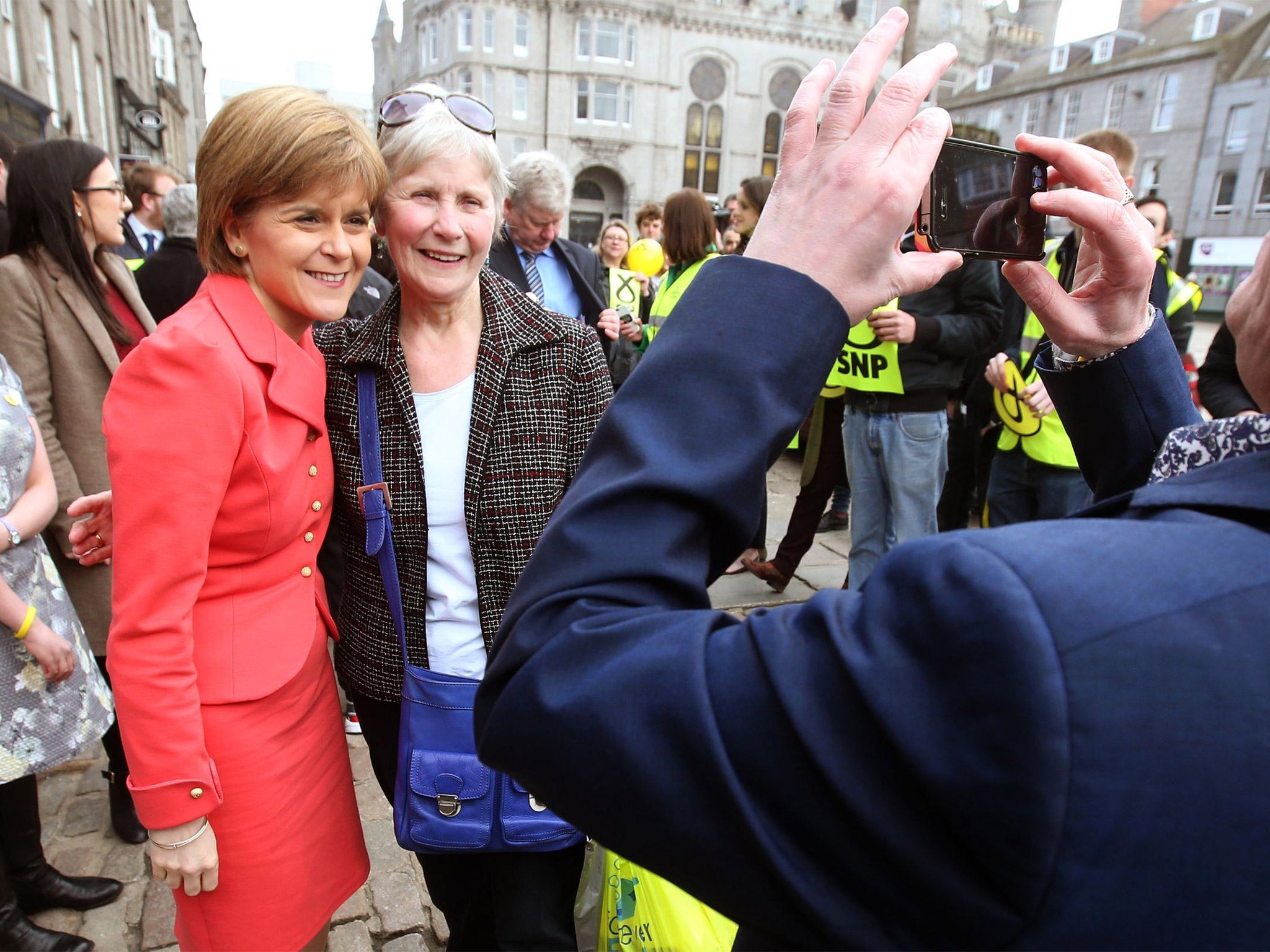Armando Iannucci: We’ve become a land of Sturgeonettes, pining to be able to vote for her
There’s a yearning for someone in power who’s not a member of the Westminster squadron

Scots are cock of the electoral walk at the moment. Is Nicola Sturgeon’s popularity this election’s version of the Cleggmania that turned us all into fainting hysterics for a day in 2010? Whatever the phenomenon, Britain has become a land of Sturgeonettes, pining for the ability to be able to vote for her.
No one seems to have explained that even Scottish voters can’t vote for her: she’s not standing for a Westminster seat. But it’s a nice dream and one that encapsulates the topsy-turvy world British politics has entered. The leader of a party whose prime purpose is to break up the Union seems the one politician who most offers a conciliatory message of how partnership can work in politics. She’s become a strangely unifying force.
Compare her with Nigel Farage who used his TV appearance last week not to only to plead for us to put foreign HIV-positives back on the next ferry to oblivion, but who berated the Scots for having a better spending deal than the rest of Britain. He promised under Ukip he would reverse that by penalising Scots more, thus writing off Scotland as a source of any Ukip support. For the one man who has the words United Kingdom in the title of his party, he seemed like he least believed in it.
It’s no surprise that this election doesn’t make sense; what else can you expect from an electoral system designed to operate efficiently only when there are two main parties? Introduce up to three others and you have a system that should be fast-tracked to A&E.
It would be easy, then, to think the only response to this democratic mess is to stay at home and not bother voting, but I like to think the complexity of what’s on offer provides some fresh way out. The fact that a lot of English voters are asking Nicola Sturgeon if they can vote for her may look like a misunderstanding of the constitution, but it’s actually the expression of a heartfelt frustration with the way politics is being played out nationally. It’s a yearning to vote for someone other than a member of the Westminster squadron who sit in London’s square mile and feel they should have complete control of every aspect of the UK.
For decades, Westminster has removed more and more power from local government, under the vote-grabbing headline of freedom of choice. Housing, school curriculum and testing, transport, and health standards, have all been micromanaged by ministers and special advisors in London. Austerity cuts have also reduced local government budgets by 30 per cent. More and more, what happens on a daily basis in Barnstable and Leeds is determined by the priorities of the occupant of 10 Downing Street. Our Big Society is being controlled from a Small Building.
The electorate is waking up to the fact that this is an inefficient way to run a country. It’s no surprise that the further you get out of London, the more national politics fragments into a series of radically diverse battles, between Labour and SNP in Scotland, Conservative and Liberal Democrat in the South-west of England, Labour and Ukip in the North, Conservative and Ukip on the South-east coast. With the Greens darting in and out of various areas where the contest would otherwise seem too conventional...
Is this not a healthy development, since it recognises a diversity of needs for different parts of the nation? Setting aside the question of whether our creaking voting system will give us a proper reflection of these different needs come the morning of 8 May, shouldn’t we acknowledge that this is where elections will be trending for the foreseeable future?
I don’t see it as some apocalyptic disintegration of the UK but as each part of the country beginning to reclaim its right to argue for its own form of politics. It’s telling that the more Cameron threatens Britain with the prospect of a Labour and SNP pact, the more the SNP’s vote goes up in Scotland and the more Labour’s goes up in the rest of the UK. While some politicians paint nationalism as a calamity, the electorate sees cooperation between parties as liberating.
We’re asked to view Nicola Sturgeon propping up a Labour government as a negative development on the grounds that it would lead to another referendum on Scottish independence. But that view is just one, very Westminster-centric, conventional view of politics.
Is it too much to hope that a non-conventional, non-Westminster scenario would have regional MPs of all parties starting to demand more power for their regions too as the price for allowing the SNP any say in the running of the UK? If that were the case and we arrived at a more equitable UK, power-sharing across the four nations may yet give us a more interesting and stable politics.
********************
The Independent has got together with May2015.com to produce a poll of polls that produces the most up-to-date data in as close to real time as possible.
Click the buttons below to explore how the main parties' fortunes have changed:
All data, polls and graphics are courtesy of May2015.com. Click through for daily analysis, in-depth features and all the data you need. (All historical data used is provided by UK Polling Report)
Join our commenting forum
Join thought-provoking conversations, follow other Independent readers and see their replies
Comments
Bookmark popover
Removed from bookmarks